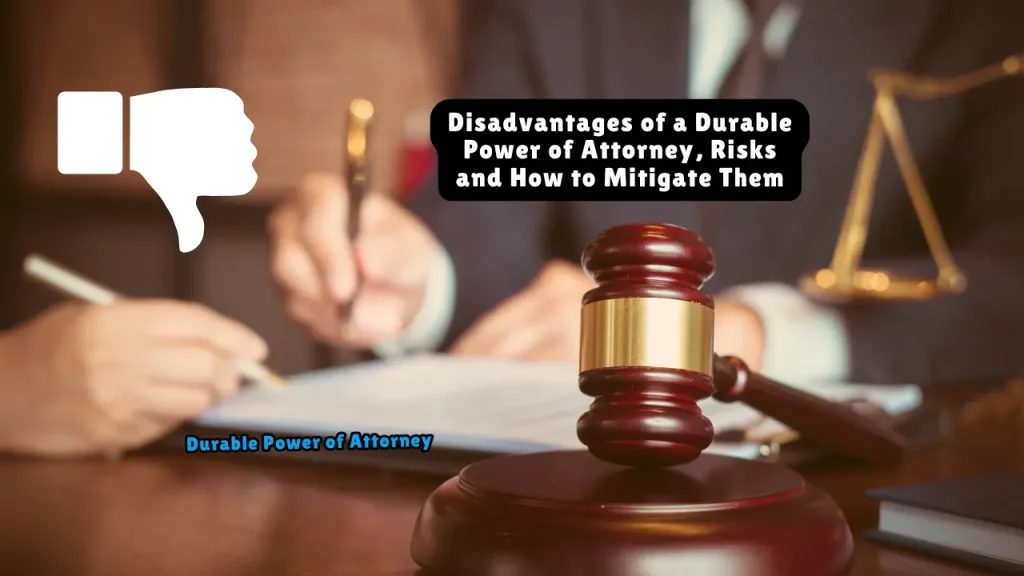Disadvantages of a Durable Power of Attorney, Risks and How to Mitigate Them
A durable Power of Attorney (POA) offers critical protections if you become incapacitated, but it has significant risks: financial exploitation, lack of oversight, loss of autonomy, and irrevocability once you’re incapacitated. Without safeguards, agents can abuse their authority, family disputes can erupt, and poor decisions can drain assets.
Table of Contents
Key Disadvantages of a Durable Power of Attorney
1. Risk of Financial Exploitation
A durable POA grants broad authority, making it easy for an agent to misuse funds. Common abuses include:
- Draining bank accounts or selling property for personal gain.
- Making unauthorized gifts to themselves or others.
- Incurring debt in the principal’s name.
Example:
In Estate of Johnson v. Smith (California, 2021), an agent used a durable POA to transfer $250,000 of her mother’s savings to her personal account. The court ordered restitution and revoked the POA.
Mitigation:
- Limit the agent’s authority (e.g., prohibit gifting).
- Require third-party oversight (e.g., annual account reviews by a lawyer).
2. No Automatic Oversight
Unlike guardianship (which requires court supervision), a durable POA operates privately. Agents can act without accountability until a dispute arises.
Red Flags:
- Unexplained withdrawals or property transfers.
- The agent refuses to share financial records.
Quote from a Legal Expert:
“A durable POA is like handing someone a blank check. Without checks and balances, the temptation to abuse it is real.”
— Mark Thompson, Elder Law Attorney (Cited in AARP, 2023).
3. Loss of Autonomy
Once signed, the principal cannot easily reverse decisions made by the agent, even if they disagree. If the POA is immediate (not springing), the agent can act while the principal is still competent.
Example:
A father with early dementia disagreed with his son’s decision to sell his car but couldn’t legally stop it because the durable POA was already active.
4. Difficulty Revoking After Incapacity
If the principal becomes incapacitated, they can’t revoke the POA. Family members must petition the court to terminate it, which is costly and time-consuming.
5. Family Conflicts
Disputes often arise when:
- Siblings disagree with the agent’s choices.
- The agent prioritizes their interests over the principal’s.
- The POA conflicts with a will or trust.
Real-Life Case:
In In re Guardianship of Lee (Texas, 2022), siblings sued their brother, the POA agent, for selling family land without consultation. The court appointed a neutral guardian.
6. Poor Decision-Making by the Agent
Even well-meaning agents can make mistakes due to:
- Lack of financial expertise.
- Emotional bias (e.g., refusing hospice for a terminal parent).
Related article for you:
Does a Power of Attorney Need to Be Filed With the Court in Georgia?

State-Specific Risks
| State | Key Concerns |
| Florida | Agents can create “pre-need guardian” clauses, complicating future challenges. |
| New York | Requires a Statutory Gifts Rider for gifting—omitting it invalidates transfers. |
| California | Stricter penalties for elder abuse but high burden of proof for victims. |
How to Reduce Risks
1. Use a “Springing” Durable POA
- Activates only upon incapacity (requires doctor certification).
- Prevents agents from acting while the principal is competent.
2. Add Safeguards to the POA
- Require co-agents to act jointly.
- Mandate annual reporting to a third party (e.g., lawyer, accountant).
- Prohibit specific actions (e.g., changing beneficiaries, selling homes).
3. Pair with a Trust
A trust provides stricter oversight, requiring trustee accountability to beneficiaries.
4. Regular Audits
Monitor accounts and property titles for unauthorized changes.
When a Durable POA Is Not Enough
If abuse occurs:
- Revoke the POA (if the principal is still competent).
- Report to Adult Protective Services.
- Sue the agent for breach of fiduciary duty.
- Petition for guardianship to override the POA.
Key Takeaways
- A durable POA risks financial abuse, family disputes, and loss of control.
- Springing POAs, co-agents, and third-party oversight reduce risks.
- Act quickly if exploitation is suspected—delay can lead to irreversible harm.
Bottom Line: A durable POA is powerful but perilous. Draft it carefully with an attorney, limit the agent’s powers, and stay vigilant.
Checklist to Prevent POA Abuse
- Use a springing POA to delay activation.
- Name co-agents or require third-party reviews.
- Prohibit risky actions (gifting, loans to the agent).
- Store the original POA with your attorney.
- Update the POA after major life changes.
Need Help?
- National Elder Fraud Hotline: 1-833-372-8311
- American Bar Association: Find an Elder Law Attorney
About the Author

Sarah Klein, JD, is an experienced estate planning attorney who has helped clients with wills, trusts, powers of attorney, and probate matters. At All About Lawyer, she simplifies complex estate laws so families can protect their assets, plan ahead, and avoid legal headaches during life’s most sensitive moments.
Read more about Sarah
